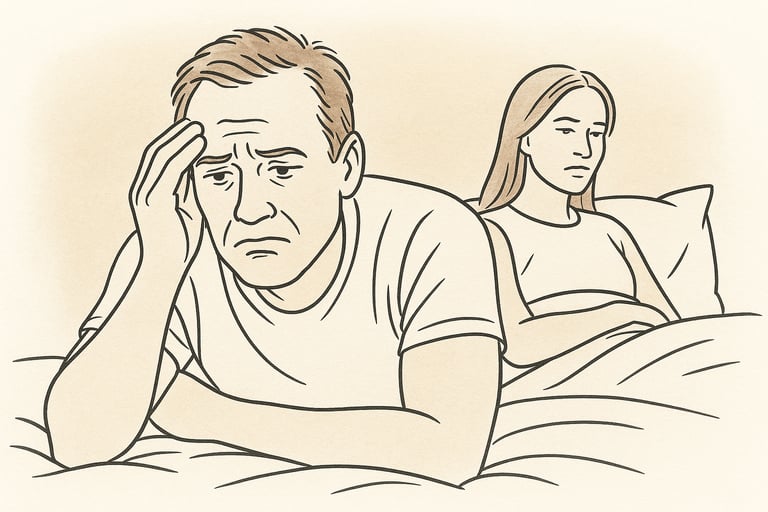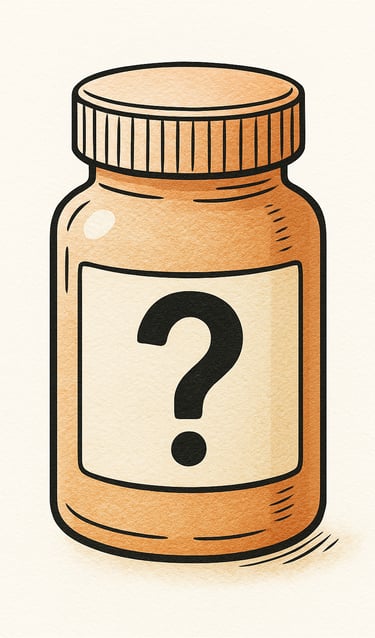Delayed Ejaculation: How to Rewire Your Body to Finish
What is delayed ejaculation?
Treatments for delayed ejaculation
Causes
How to rewire your body
Delayed ejaculation (often shortened to DE) is formally defined as a man’s inability to finish with a partner or taking so long that it becomes distressing, on most occasions, for at least six months[1]. The official medical definition doesn’t give a specific minute count for delayed ejaculation. It leaves it at “marked delay,” “infrequency or absence” of ejaculation in most sexual encounters over a period of six months. Having said that, most men need four to ten minutes to finish and doctors generally consider 25-30 minutes as the cut-off point[2]. Men with DE typically have no issues attaining or maintaining erections.
DE can be either lifelong, since the man became sexually active, or acquired, in other words arising after an earlier period of normal sexual functioning. Another distinction is generalized DE, which occurs with all situations and partners, versus situational, which only occurs with certain partners or situations.
There is no one-size-fits-all cure for delayed ejaculation. Doctors don’t have a magic pill for it, and treatment often leaves men even more frustrated. DE is actually one of the most under-researched sexual disorders in men, leaving doctors to try a very wide list of treatments, often experimentally[4].
If the issue is mainly psychological then the first line of treatment is usually some form of therapy. This might include cognitive behavioral therapy, sex education, couples’ therapy, or exercises that retrain the body and mind to respond differently during sex.
When physical factors are involved, doctors sometimes try medication. None are officially approved for delayed ejaculation, but drugs like bupropion, cabergoline, amantadine, or even testosterone (if a deficiency is present) have been tried[5]. Results are mixed, and side effects can be significant. In men whose DE is triggered by antidepressants, doctors may switch the medication or add another drug to balance things out.
The same way a body can be trained into delayed ejaculation, it can be trained out of it. The nervous system isn’t fixed; it adapts to whatever routine you feed it. That’s the problem with idiosyncratic or high-pressure masturbation: it conditions the penis and brain to expect one narrow kind of input. But the good news is that conditioning can be reversed.
Rewiring starts with breaking the grip cycle. If your body has been conditioned to expect a crushing fist, you need to step away from that. That means giving your nerves a break from the force they’ve come to rely on and introducing new, lighter inputs that retrain your sensitivity. At first, these gentler touches might not feel like much. That’s normal. The key is consistency. Over days and weeks, those dormant nerve pathways wake up, and the brain relearns how to register subtler stimulation as arousing.
Think of it as re-tuning an instrument that’s gone out of key. You’re not forcing it to play louder; you’re adjusting it so every note rings clear again. Once your body recalibrates, what felt impossible, namely finishing inside your partner, becomes natural again. You will be able to enjoy stronger erections and predictable orgasms, and the constant frustration will give way to pleasure that feels spontaneous rather than forced.
If you’re serious about ending delayed ejaculation and reclaiming that natural rhythm, the next step is straightforward. I’ve laid out a simple, proven protocol that guides you through the reset in one week. This isn’t the usual eHow clickbait or vague family-doctor pep talk about “reducing stress” and “trying new positions.” It’s a step-by-step system built on how your nerves actually adapt and how to re-train them for reliable, natural orgasms. Go here to start rewiring your body today.
Sources
[1] American Psychiatric Association. (2022). Diagnostic and statistical manual of mental disorders (5th ed., text rev.).
[2] Rowland, D., McMahon, C. G., Abdo, C., Chen, J., Jannini, E., Waldinger, M. D., & Ahn, T. Y. (2010). Disorders of orgasm and ejaculation in men. The journal of sexual medicine, 7(4_Part_2), 1668-1686.
[3] Abdel-Hamid, I. A., & Ali, O. I. (2018). Delayed ejaculation: pathophysiology, diagnosis, and treatment. World Journal of Men's Health, 36(1).
[4] Pizzol, D., Trott, M., Wilson, J. J., Tully, M. A., Shah, S., Pratsides, L., ... & Smith, L. (2024). Treatments for delayed ejaculation: a narrative review. Trends in Urology & Men's Health, 15(4), 13-17.
[5] Abdel-Hamid, I. A., Elsaied, M. A., & Mostafa, T. (2016). The drug treatment of delayed ejaculation. Translational andrology and urology, 5(4), 576.
[6] Perelman, M. A. (2005). 1254: idiosyncratic masturbation patterns: a key unexplored variable in the treatment of retarded ejaculation by the practicing urologist. The Journal of Urology, 173(4S), 340-340.
[7] Xia, J. D., Han, Y. F., Pan, F., Zhou, L. H., Chen, Y., & Dai, Y. T. (2013). Clinical characteristics and penile afferent neuronal function in patients with primary delayed ejaculation. Andrology, 1(5), 787-792.
On paper, the list of possible causes is very long[3]. Very broadly, we can group these causes into two separate groups: psychosocial and organic/biological. The psychosocial factors include:
· High-frequency masturbation
· Idiosyncratic and vigorous masturbation style (more on that soon)
· Performance anxiety
· Sexual orientation conflicts
· Disparity between fantasy and partner
· Depression and other psychological problems
The organic factors on the other hand can be:
· Medications like antidepressants, antipsychotics and 5-alpha reductase inhibitors. Some of these can cause up to a seven-fold increase in the risk of DE.
· Congenital anatomical factors
· Diabetes
· Multiple sclerosis
· Spinal cord injury
· Prostatitis
It’s also possible that DE is caused by a combination of psychosocial and/or biological factors. As a general rule, the younger a man, the less likely their DE has organic causes. As men age, on the other hand, they are more likely to develop health problems and take medications which will contribute to DE.
The elephant in the room
Most doctors won’t even mention masturbation, even though it’s often the missing piece in the whole discussion. Earlier we listed it as the very first psychosocial factor in delayed ejaculation. That’s not a coincidence. Study after study shows that how a man masturbates has a major effect on how he responds with a partner.
In men with lifelong DE, researchers found that they were much more likely to masturbate often and to rely on unusual or idiosyncratic styles: rubbing against a bed, applying strong pressure on the perineum, or even using objects like socks in ways no partner could replicate[6]. These patterns can condition the penis and nervous system to expect a level or type of stimulation that ordinary sex simply doesn’t provide. The result is that a man can climax alone but struggles in partnered sex.
Neurophysiology studies back this up: men with DE not only masturbate more than average, but as a result also show reduced sensitivity in the penile shaft, suggesting their nerves have adapted to years of heavy, repetitive stimulation[7]. In plain terms, they’ve trained their penises to respond to the high force that the palm of their closed fist can generate, which the vagina cannot match. The vagina not only exerts a fraction of the force, but is designed to supply a lot of its stimulation through variations in texture. High-frequency, high-force masturbation literally trains the penis to become numb, and the stimulation of the vagina becomes insufficient for ejaculation.
The takeway for you is this: if you are young (under 40), have no relevant health conditions and are not on medications, then chances are your delayed ejaculation is linked to the way you masturbate.


The presence of distress is very important in diagnosing DE. If a man and his partner are content with long sessions, then it isn’t considered a problem, much less a disorder. Some couples even prefer it, seeing a slow build as a way to prolong intimacy. DE only becomes a problem when it causes frustration, anxiety, or interferes with fertility. The distress often arises not only on the side of the man, but also his partner, who may question her own attractiveness or her partner’s own attraction to her.
At any point in time, DE affects up to 5% of all men in the population. It also becomes more likely as a man ages. This is partly because the penis naturally loses its sensitivity, but more importantly because of the onset of various health problems that can lead to DE.


connect
Stay informed with our latest updates.
learn
info@sensitivityreset.com
© 2025. All rights reserved.
Disclaimer: The information provided on this site is for educational purposes only and is not a substitute for professional medical advice, diagnosis, or treatment. Always seek the advice of your physician or other qualified health provider with any questions you may have about a medical condition..
